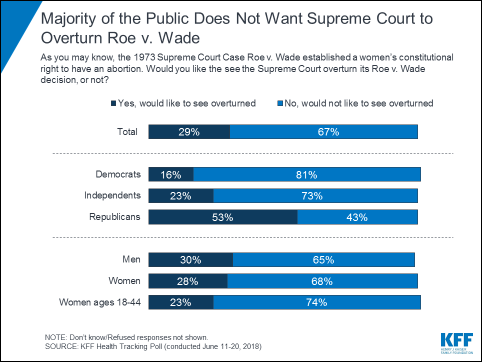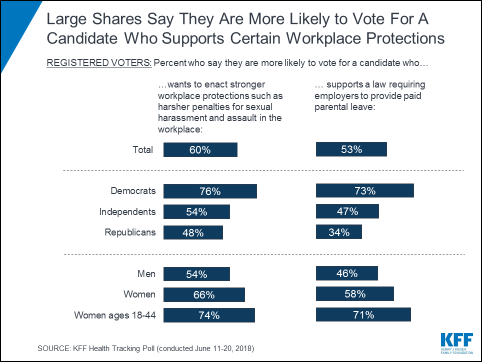
The independent source for health policy research, polling, and news.
Poll: Two-thirds of Americans Don’t Want the Supreme Court to Overturn Roe v. Wade
Equal Pay and Fair Employment Practices are Voters’ Top Concerns among Women’s Issues
Contacts
Large Majority of the Public View Federal Funding of Family Planning Services for Low-Income Women as “Important”
As President Trump prepares to make a new Supreme Court nomination, new polling from the Kaiser Family Foundation finds that two-thirds (67%) of the public do not want the Supreme Court to overturn the 1973 landmark Roe v. Wade decision that established women’s constitutional right to abortion.
Fielded this month prior to Justice Anthony Kennedy’s retirement announcement, the poll finds about three in 10 Americans (29%) say they want the Supreme Court to overturn Roe v. Wade. The case is expected to be a major flashpoint in the Senate debate over Justice Kennedy’s replacement, as Justice Kennedy has been a swing vote on abortion on a court closely divided on the issue.
The poll finds a slim majority (53%) of Republicans would like to see Roe v. Wade overturned, while large majorities of Democrats (81%) and independents (73%) would not. Similar shares of women (68%) and men (65%) want Roe v. Wade to stand, but among women of reproductive age, three-quarters (74%) want Roe v. Wade to stand.
The public overall is split on how easily they think women can access abortion services in their communities today – with major differences in perceptions by party. About a quarter (27%) say it is “too easy” for women to get these services, while one in five (22%) say it is “too difficult” and about a third (35%) say it is “about right.” Half (51%) of Republicans say it is too easy, while nearly four in 10 (37%) Democrats say “too difficult.”
In light of the attention generated by the #MeToo movement and 2018 primary victories by female candidates, the poll looks ahead to November’s midterm elections and examines the public’s and voters’ views on a broad range of issues affecting women, including sexual harassment, paid parental leave and reproductive health.
While not at the top of voters’ concerns heading into the midterms, most voters (56%) do say it is at least “very important” for candidates to discuss issues that primarily affect women.
When this group is asked to say in their own words what issues they mean, about four in 10 (44%, or 25% of all voters) mention issues related to equal pay or fair employment. This is twice as many as those who mention reproductive health issues including abortion or contraception (20%, or 11% of all voters).
In addition, substantial shares of voters say that a candidate’s position on certain policies that mainly affect women will influence their vote.
For example, six in 10 (60%) voters say they would be more likely to vote for a candidate who supports increased workplace protections against sexual harassment and assault, and a majority (53%) say the same about a candidate who supports a law requiring paid parental leave. Democratic voters and women voters are more likely to favor candidates who support each of these positions than are Republican voters and men voters.
Voters are divided along partisan lines on how a candidate’s position on access to abortion services will affect their vote. Overall about four in 10 (42%) voters say they are more likely to vote for a candidate who supports access to abortion services, while three in 10 (29%) say they are more likely to vote for a candidate who wants to restrict access to abortion services. Most (72%) Democratic voters say they are more likely to vote for a candidate who supports abortion access, while most (58%) Republican voters say they are more likely to vote for a candidate who wants to restrict abortion access.
The international #MeToo movement working to raise awareness about sexual harassment and assault is also a touchstone for many voters. Half (49%) say they are more likely to support a candidate who is a strong supporter of the #MeToo movement, while just 7 percent say they are more likely to vote for a candidate who does not address the issues raised by the movement.
Other findings from the poll include:
- Eight in 10 (80%) of the public say federal funding for family planning and other reproductive health services to low-income women is “very important” or “somewhat important” to them. This includes most Republicans (59%) and the overwhelming majority (94%) of women 18-44.
- Most of the public (57%) say they oppose new Title X regulations proposed by the Trump Administration that would block federal family planning funds from going to organizations like Planned Parenthood, which also provide abortions, even though the money can’t be used for abortion. Nearly four in 10 (38%) say they favor those proposed regulations.
- Most (55%) of the public says that women’s access to family planning services in their communities is “about right,” while twice as many say it is “too difficult” than say it is “too easy” (24% and 12%, respectively). Among women of reproductive age who are more likely to have direct experience, about one-third (35%) say it is “too difficult” to access such services, five times the share who say it is “too easy” (7%).
Designed and analyzed by public opinion researchers at the Kaiser Family Foundation, the poll was conducted from June 11-20, 2018 among a nationally representative random digit dial telephone sample of 1,492 adults. Interviews were conducted in English and Spanish by landline (319) and cell phone (1,173). The margin of sampling error is plus or minus 3 percentage points for the full sample. For results based on subgroups, the margin of sampling error may be higher.

